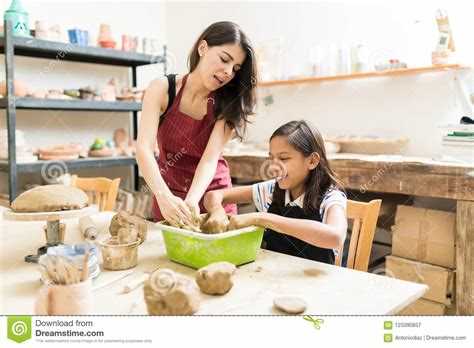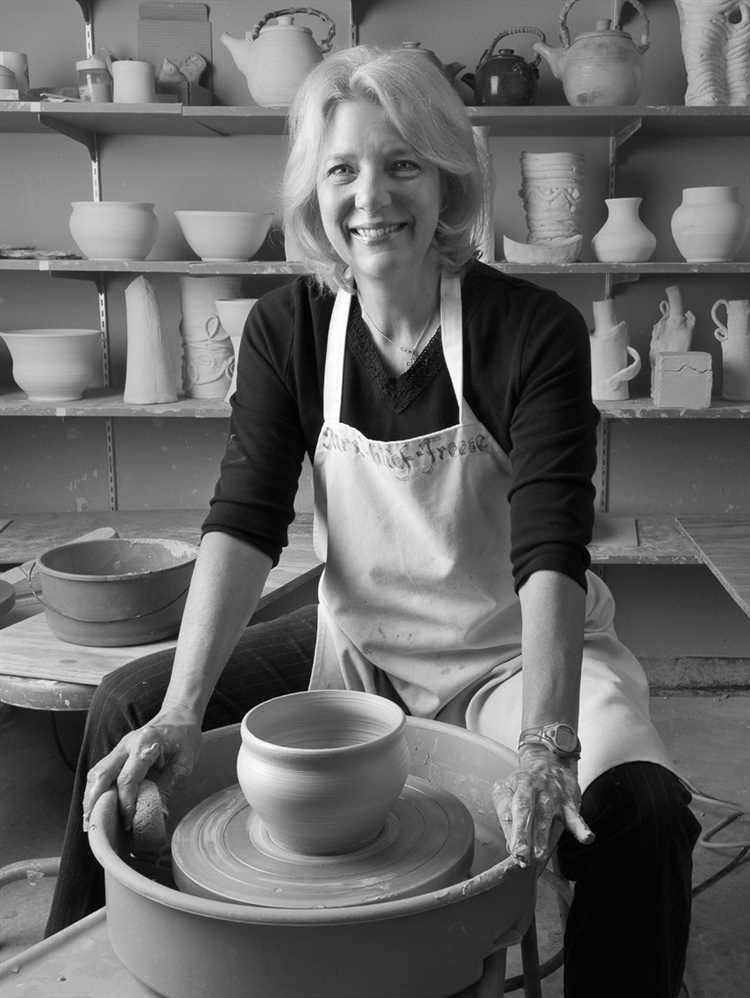Becoming a pottery teacher is a rewarding and fulfilling career choice for those with a passion for ceramics and a desire to share their knowledge with others. Whether you have years of experience as a potter or are just starting out, teaching pottery can be a great way to inspire and educate others while continuing to pursue your own artistic journey.
In this ultimate guide, we will outline the five key steps you need to take in order to become a pottery teacher. From honing your skills and developing your teaching style to finding the right educational opportunities and building a student base, we will cover everything you need to know to embark on this exciting path.
First and foremost, it is essential to have a strong foundation in pottery. This means dedicating time to honing your skills as a potter and familiarizing yourself with different techniques and styles. Whether you prefer throwing on the wheel or hand-building, it is important to become proficient in a variety of pottery techniques in order to effectively teach them to others.
Once you feel confident in your own abilities as a potter, the next step is to develop your teaching style and methodology. This involves understanding different learning styles, creating lesson plans, and acquiring the necessary teaching materials and resources. Developing a clear and concise teaching method will not only make your classes more effective but also help you establish a strong reputation as a pottery teacher.
Step 1: Acquire Pottery Skills
Before you can become a pottery teacher, it is important to acquire the necessary pottery skills. This step will involve gaining proficiency in various pottery techniques and understanding the different types of pottery materials.
Here are some key aspects to consider in order to acquire pottery skills:
- Take Pottery Classes: Enroll in pottery classes at a local community center, art school, or pottery studio. These classes will provide you with hands-on experience, guidance, and feedback from experienced pottery instructors.
- Practice Regularly: Dedicate time to practice pottery on a regular basis. This will help you develop muscle memory and refine your skills. Consider setting up a small pottery studio at home or renting shared studio space.
- Experiment with Different Techniques: Explore various pottery techniques, such as handbuilding, wheel throwing, glazing, and firing. Try different styles and methods to broaden your knowledge and expertise.
- Study Pottery History: Learn about the history and evolution of pottery. Understanding the cultural and artistic significance of pottery will deepen your appreciation for the craft and enable you to provide insightful information to your future students.
- Attend Workshops and Conferences: Attend pottery workshops and conferences to learn from renowned potters and ceramic artists. These events often offer specialized training and advanced techniques that can enhance your skills.
Remember to be patient with yourself during the learning process. Acquiring pottery skills takes time and practice. Embrace the joy of creating with clay, and soon you will be ready to move on to the next step: building a teaching portfolio.
Step 2: Gain Experience through Apprenticeships
Becoming a pottery teacher requires a deep understanding and mastery of pottery techniques. One of the best ways to gain this experience is through apprenticeships. Apprenticeships allow you to learn directly from experienced pottery instructors and gain hands-on experience in a real pottery studio.
Here are some steps you can take to find and participate in apprenticeships:
- Research Local Pottery Studios: Look for pottery studios in your area that offer apprenticeship programs. Check their websites, social media pages, or contact them directly to inquire about availability and requirements.
- Prepare a Portfolio: Put together a portfolio of your pottery work to showcase your skills and passion for the craft. This will help you stand out during the application process.
- Submit Applications: Submit your apprenticeship applications to the pottery studios you are interested in. Make sure to provide all required documents, including your portfolio, resume, and any other requested materials.
- Attend Interviews: If selected for an interview, be prepared to discuss your experience, goals, and why you are interested in becoming a pottery teacher. Show enthusiasm and a willingness to learn from the experienced instructors.
- Start Apprenticeship: Once accepted into an apprenticeship program, you will begin working closely with pottery instructors. Take advantage of this opportunity to learn various pottery techniques, improve your skills, and gain valuable teaching insights from your mentors.
Apprenticeships can range in duration, from a few months to several years. The length of the program will depend on the studio and the level of expertise you wish to achieve. Remember, the more time you spend as an apprentice, the more experience and knowledge you will gain.
Take note that apprenticeships may not always be paid opportunities. Some studios may offer compensation, while others may provide valuable experience in exchange for your assistance in the studio. Consider your financial situation and commitments before committing to an unpaid apprenticeship.
Gaining experience through apprenticeships is a vital step in your journey to becoming a pottery teacher. It allows you to learn from experts in the field, refine your skills, and develop your own teaching style. Embrace this opportunity to immerse yourself in the world of pottery and build a solid foundation for your future career as a pottery teacher.
Step 3: Pursue Higher Education in Pottery
To become a pottery teacher, it is important to have a strong foundation in pottery techniques and knowledge. Pursuing higher education in the field of pottery will not only enhance your skills but also provide you with valuable insights and expertise that you can pass on to your future students.
Here are some options to consider when pursuing higher education in pottery:
- Enroll in a Pottery Program: Look for universities, colleges, or art schools that offer specialized programs or courses in pottery. These programs typically provide a comprehensive curriculum that covers various pottery techniques, including wheel throwing, handbuilding, glazing, and firing. They may also include courses in art history, ceramics theory, and kiln operation.
- Obtain a Bachelor’s or Master’s Degree: Consider pursuing a bachelor’s or master’s degree in ceramics or fine arts with a concentration in pottery. These degree programs often provide a more in-depth study of pottery techniques, artistic expression, and critical analysis. They may also offer opportunities for research and experimentation in pottery.
- Attend Pottery Workshops and Residencies: Participate in pottery workshops and residencies led by renowned pottery artists. These short-term programs offer intensive training and focus on specific aspects of pottery, such as advanced throwing techniques, surface decoration, or kiln firing. They provide a unique opportunity to learn from experts in the field and expand your knowledge and skills.
- Join Pottery Associations and Organizations: Become a member of local or national pottery associations and organizations. These professional bodies often organize conferences, symposiums, and workshops that are specifically designed for pottery professionals. By participating in these events, you can network with other pottery teachers and artists, gain exposure to different teaching methodologies, and stay updated on the latest trends and advancements in the field.
- Gain Teaching Experience: While pursuing higher education in pottery, take advantage of opportunities to gain teaching experience. This can be done through internships, assistantship programs, or volunteering at pottery studios or art centers. Teaching experience will not only help you develop your instructional skills but also demonstrate your commitment and passion for teaching pottery.
Remember, higher education in pottery is not only about acquiring technical skills, but it is also about deepening your understanding of the art form, fostering creativity, and developing your own unique style. It is a continuous process of learning and self-discovery that will greatly benefit you as a pottery teacher.
Step 4: Develop Teaching Skills
Being a pottery teacher requires more than just being skilled in pottery techniques. It also involves being able to effectively teach and communicate with students. Here are some steps to help you develop your teaching skills:
- Gain experience as a student: Take pottery classes or workshops to gain a deeper understanding of the student experience. This will help you empathize with your future students and understand their concerns and challenges.
- Observe other pottery teachers: Attend classes taught by experienced pottery teachers and observe their teaching styles. Pay attention to how they engage with their students, explain techniques, and provide feedback.
- Take teaching courses: Consider enrolling in teaching courses or workshops to learn about different teaching methodologies and strategies. This will provide you with a solid foundation in educational theory and practice.
- Practice teaching: Start practicing your teaching skills by offering to teach friends or family members. This will give you an opportunity to refine your teaching techniques and receive feedback.
- Seek feedback: Ask for feedback from your students on your teaching style, clarity of instructions, and overall effectiveness as a teacher. Take their feedback seriously and use it to improve your teaching skills.
Remember, becoming a great pottery teacher takes time and practice. By continuously developing your teaching skills, you will be able to create a supportive and engaging learning environment for your students.
Step 5: Obtain Certifications and Licenses
Once you have gained experience and honed your skills as a pottery teacher, it’s important to obtain the necessary certifications and licenses to solidify your credibility and professionalism in the field. These certifications and licenses will enhance your chances of attracting students and building a successful pottery teaching business.
There are several certification programs and organizations that offer credentials specifically for pottery teachers. These programs typically involve a combination of practical demonstrations, written exams, and teaching evaluations to ensure that you have the necessary knowledge and skills to effectively teach pottery.
Some popular certification programs for pottery teachers include:
- Certified Ceramic Educator (CCE) Program: Offered by the National Council on Education for the Ceramic Arts (NCECA), this program is designed to recognize excellence in ceramic education. It requires candidates to demonstrate their teaching abilities, knowledge of ceramic materials and techniques, and understanding of art history and aesthetics.
- Pottery Instructor Certification (PIC) Program: This program, offered by the American Ceramic Society (ACS), focuses on both technical and instructional skills. It covers topics such as clay preparation, kiln firing, glazing techniques, and teaching methodologies. Candidates must pass a written exam and submit a portfolio showcasing their work and teaching experiences.
In addition to certifications, it may also be necessary to obtain licenses to legally operate as a pottery teacher. The requirements for licenses vary depending on your location, so it’s important to research and comply with local regulations.
Some common licenses that pottery teachers may need to obtain include:
- Business License: This license is required to legally operate a pottery teaching business. It ensures that you comply with local business laws and regulations.
- Studio Permit: If you plan to teach pottery classes in your own studio, you may need to obtain a studio permit. This ensures that your studio meets the necessary safety and zoning requirements.
It’s important to thoroughly research the certification programs and licenses that are relevant to your specific location and teaching goals. Obtaining these credentials will not only enhance your professional standing but also provide peace of mind to potential students who are looking for a qualified and reputable pottery teacher.
Remember, continuous learning and professional development are key to staying current and offering the best possible pottery education to your students.
Additional Resources for Pottery Teachers
As a pottery teacher, it’s important to continually expand your knowledge and stay up-to-date with the latest techniques, tools, and resources available. Here are some additional resources that can help you enhance your pottery teaching skills:
- Books: There are several books available that provide valuable insights and techniques for pottery teachers. Some recommended titles include “Teaching Clay in the Classroom” by Mel Jacobs, “The Essential Guide to Ceramic Arts and Crafts” by Daniel Rhodes, and “The Complete Idiot’s Guide to Pottery” by Dodi Beasley.
- Online Courses: Online courses offer the flexibility to learn at your own pace and explore different aspects of pottery teaching. Websites like Udemy, Skillshare, and Coursera offer a wide range of pottery-related courses, including specific topics like handbuilding, wheel throwing, glazing techniques, and more.
- Workshops and Conferences: Attending workshops and conferences can provide valuable networking opportunities and allow you to learn from experienced pottery teachers. Look for local and national events that focus on pottery education and consider joining professional organizations such as the National Council on Education for the Ceramic Arts (NCECA) to stay connected with the pottery teaching community.
- Online Forums and Communities: Engaging with online forums and communities can help you connect with other pottery teachers, share ideas, and seek advice. Websites like Ceramic Arts Network and Pottery Making Illustrated have active forums where you can ask questions, participate in discussions, and learn from experienced instructors.
- Suppliers and Manufacturers: Building relationships with pottery suppliers and manufacturers can provide access to new tools, materials, and equipment. Reach out to local suppliers, attend trade shows, and explore online marketplaces like Etsy, where you can find unique pottery supplies and connect with other artists and teachers.
By utilizing these additional resources, you can enhance your pottery teaching skills, stay inspired, and continue to grow as an educator in the field of pottery.
FAQs about Pottery Teaching
1. Do I need to be an expert in pottery to become a pottery teacher?
No, you don’t need to be an expert in pottery to become a pottery teacher. However, having a solid understanding and experience in pottery techniques and processes is essential. It’s important to be able to demonstrate and explain different techniques to your students.
2. Can I teach pottery without a formal education?
Yes, you can teach pottery without a formal education. While a formal education in pottery or art can be beneficial, it is not a requirement. Many successful pottery teachers have learned through workshops, apprenticeships, and self-study. It’s important to continuously educate yourself and improve your skills as a pottery teacher.
3. How can I find students to teach pottery?
There are several ways to find students to teach pottery. You can start by promoting your classes through social media, creating a website or blog, and networking with local art organizations and schools. Additionally, you can offer workshops and classes at community centers, art galleries, or local craft stores. Word of mouth can also be an effective way to attract students.
4. How much should I charge for pottery classes?
The price of pottery classes can vary depending on several factors, including your location, the duration of the class, the materials provided, and your expertise. Research what other pottery teachers in your area are charging and consider the costs involved in running the class. It’s important to find a balance between setting a price that is fair to both you and your students.
5. What should I include in my pottery classes?
In your pottery classes, you should include a combination of demonstrations, hands-on practice, and individual guidance. Provide your students with a variety of projects to work on, focusing on different techniques and skills. It’s important to create a supportive and inclusive environment where students feel comfortable asking questions and exploring their creativity.
FAQ:
What qualifications do I need to become a pottery teacher?
To become a pottery teacher, you typically need a good understanding of pottery techniques and processes. Many pottery teachers have undergone formal education in ceramics or have years of experience working as professional potters. Additionally, having a teaching certification or experience in teaching art can be beneficial.
How can I improve my pottery skills?
There are several ways to improve your pottery skills. First, you can take classes or workshops led by experienced potters. This will give you the opportunity to learn new techniques and receive feedback on your work. Practicing regularly and experimenting with different pottery forms and glazes can also help you improve. Additionally, studying pottery books and attending pottery conferences or exhibitions can broaden your knowledge and inspire you to try new things.
What qualities make a good pottery teacher?
A good pottery teacher should have strong communication skills to effectively convey instructions and concepts to students. Patience is also important, as pottery can be a challenging skill to learn and mistakes are bound to happen. Creativity and the ability to think outside the box can help a pottery teacher come up with unique projects and techniques for their students. Lastly, a passion for pottery and a genuine desire to help others learn and grow in their skills are vital qualities for a successful pottery teacher.
How can I find pottery teaching opportunities?
There are various ways to find pottery teaching opportunities. You can start by reaching out to local pottery studios, community centers, or art schools to inquire about teaching positions or workshops. Networking with other potters and joining pottery associations or guilds can also lead to teaching opportunities. Additionally, you can consider starting your own pottery classes or offering private lessons to individuals interested in learning pottery.
Is it possible to make a living as a pottery teacher?
Yes, it is possible to make a living as a pottery teacher, but it may require diversifying your income sources. Teaching regular pottery classes, workshops, and private lessons can provide a stable income. Additionally, selling your own pottery pieces, participating in art fairs or exhibitions, and offering online courses or tutorials can help supplement your earnings. Building a strong reputation and establishing a loyal student base are key factors in being successful as a pottery teacher.


